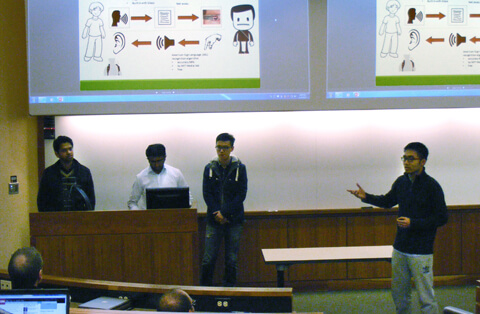Did You Know?: Lean LaunchPad courses at Purdue
March 13, 2015
 |
|
Graduate students present to class members during a meeting of the Technology Entrepreneurship and Lean Startups course, which is part of a new, highly interdisciplinary series of courses offered through Krannert School of Management. Called Lean LaunchPad, the courses began in fall 2014 and are held each semester on a different topic. (Photo provided) |
A new and highly interdisciplinary series of courses offered through Krannert School of Management gives graduate students a hands-on look at how technology-based ideas can turn into vibrant startup companies.
Called Lean LaunchPad, the courses began in fall 2014 and are held each semester on a different topic. The courses are based on a methodology created by Steve Blank, a Silicon Valley entrepreneur who pioneered the idea in a course he taught at Stanford University in 2011.
"Purdue's Lean Launchpad courses aim to give our graduate students the methods and tools to become technology entrepreneurs," says Matthew Lynall, clinical associate professor of management, who leads the courses.
"We also want to influence the mindset of our graduate researchers to get them thinking early on about how to translate their research into a positive impact for the economy and society through various forms of commercialization, be it startups, licensing, or corporate partnerships."
In February, the National Science Foundation (NSF) awarded Purdue a three-year, $300,000 grant to support faculty and student-led startups, including the Lean LaunchPad teams, as they work to develop technology-based, evidence-driven business ideas. Lynall, who is the NSF's grant’s principal investigator, is now working with several other universities in the Midwest to obtain additional NSF support for technology commercialization at Purdue.
In the fall semesters, Purdue's Lean LaunchPad course focuses on business ideas from the life sciences. Last fall, students from biomedical engineering, technology and physics, along with MBA students, developed medical device startups in the Lean LaunchPad Biomedship course. Alyssa Panitch, professor of biomedical engineering, and Tim Peoples, executive –in-residence at the Purdue Foundry co-instructed the course. Next fall, the focus will be on biotechnology and therapeutics.
This semester, the course, called Technology Entrepreneurship and Lean Startups (TE&LS), focuses on business ideas from the fields of engineering and technology. The course's 16 graduate students are studying in fields including engineering, technology and management.
The course involves an instructor team made up of Lynall; Justin Seipel, assistant professor of mechanical engineering; Lonnie Bentley, professor of computer and information technology; and Mike Shepherd, entrepreneur-in-residence at the Purdue Foundry.
The students work in teams of four, and each team is assigned an entrepreneurial mentor. The mentors are drawn from a variety of Purdue affiliates, including alumni, Lynall says.
Each student team begins the semester with a potentially viable business idea. As the course progresses, they conduct interviews with up to 100 potential customers and other stakeholders to determine how to shape the idea to create the most value, Lynall says.
Once the business ideas are refined, the students come up with a business model to turn the idea into a viable startup.
Often the teams “pivot” away from their initial idea, Lynall says. For instance, in the fall, a team that began with an idea for a device to help elderly patients manage multiple medications ended with a mobile app to help adolescent patients manage Type 1 diabetes treatment. Two members of that team, Adam Schmidler and Nick Race, are now working with Peoples to make their idea a reality, Lynall says.
The class meets once a week, at which time the instructors review the teams' progress, provide feedback and hear from team members about next steps. Also, throughout the course, the teams place detailed information about their customer interviews and business model development on a software platform called LaunchPad Central, where instructors and mentors can provide continuous feedback.
The student teams each receive up to $2,000 from the NSF grant to use on startup-related expenses, such as prototyping and travel costs to meet with potential customers and other stakeholders. After this academic year, the courses each will accommodate up to 40 students.
The idea, Lynall says, is to equip students with the skill set needed to develop marketable technologies, determine how to maximize their value and create business models that are more likely to result in successful startups.
"In addition to the practical, experiential skills these classes are giving our students, we hope that the courses will also lead to more Purdue-created technology creating economic value and societal impact," Lynall says.
Writer: Amanda Hamon Kunz, 49-61325, ahamon@purdue.edu

